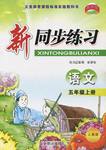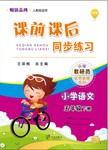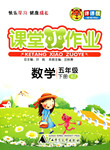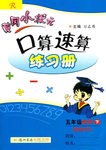
阅读理解
In the U.S.A. or Canada, on Sundays many people go out for a picnic. They often ask their good friends to go with them. They bring many things with them, like glasses, kites, knives, some nice food and some nice drink. Sometimes(有时), they take their pets with them. If(如果) it is very fine, they may have their food in a park(公园), in a countryside(乡村), or at the foot of(在……脚下) a hill. That’s great fun.
根据短文的内容,判断正(T)误(F)。
1.People in the U.S.A. don’t like to go out for a picnic on Sundays.
2. They often go for a picnic with their good friends.
3. They don’t like to bring pets with them.
4. In Canada, only kids have picnics.
5. People can’t eat in a park in Canada.
1.F
2.T
3.F
4.F
5.F
【解析】
1.根据短文的第一句In the U.S.A. or Canada, on Sundays many people go out for a picnic.可知该句是错误的。
2.由第二句They often ask their good friends to go with them.可知
3.由第四句Sometimes(有时), they take their pets with them.可知该句是错误的。
4.根据短文内容many people都喜欢野餐。
5.根据they may have their food in a park(公园)可知该句是错误的。


 教学练新同步练习系列答案
教学练新同步练习系列答案 课前课后同步练习系列答案
课前课后同步练习系列答案 课堂小作业系列答案
课堂小作业系列答案 黄冈小状元口算速算练习册系列答案
黄冈小状元口算速算练习册系列答案科目:初中英语 来源:1+1轻巧夺冠·优化训练 八年级英语(下) 题型:050
| |||||||||||||||||||||||||||||||||||||||||||||||||||||||||||||||||||||||||
查看答案和解析>>
科目:初中英语 来源:同步拓展·奥林匹克 初三英语 题型:050
阅读理解
It isn't strictly true that one half of the world is rich and the other half is poor. It is one-third that is very rich and two-thirds that are very poor.
People in the rich countries don't understand the great difference between them and those in the poorer countries. A very simple example is that a dog or a cat in north America eats better than a child in the poorer countries. A fisherman in South America may be catching fish which is processed into pet food, and his own children are not getting enough to eat for their bodies to grow properly.
Although a lot of the world's natural resources like oil come from these poorer countries, people in the richer countries are using about sixty times as much of these resources as people in Asia or Africa. And it's the richer countries that decide what kind of prices they are ready to pay for these resources. And the prices the richer countries get for their own exports, however, are always rising. So they are getting richer and richer and the poorer countries are getting poorer.
1.________ of the world is very rich and ________ very poor.
[ ]
A.One half, the other half is
B.One-third, two-thirds are
C.One-four, three-fourths are
D.One-third, one-third is
2.In the passage, the writer says that the fish a fisher-man in South America catches may be made into -.
[ ]
A.his own pet food
B.pet food for poor countries
C.pet food for richer countries
D.the food for children's bodies to grow properly
3.A lot of the world's natural resources come from ________.
[ ]
A.richer countries in Africa
B.poorer countries in the world
C.poorer countries in South America
D.countries in Asia
4.Usually it is ________ that decide the prices of the resources.
[ ]
A.the richer countries
B.the poorer countries
C.the bank of the world
D.the owner of the resources
5.________ decide the prices for the exports of the richer countries.
[ ]
A.The poor people in richer countries
B.The rich people in poorer countries
C.The poorer countries themselves
D.The richer countries themselves
查看答案和解析>>
科目:初中英语 来源:走向清华北大同步导读·初三英语 题型:050
阅读理解
Laws(法律)for children are good things. One hundred years ago in some countries, children worked eighteen hours a day in a factory at age seven. The factory owner could beat a child who fell asleep or was not fast enough. Both parents and teachers could do the same.
Today, there are many laws about children all over the world. Some people think if children do something wrong, they should be punished(惩罚). Other people do not agree. The Inuits or Eskimos in Alaska almost never punish their children. The parents do not beat them. If the children go too far, their parents will punish their children by making fun of(取笑)them.
Children in other parts of the world are not as lucky as Eskimo children. American parents can beat their children at home, but a teacher can’t beat a child in school. This is also true in Germany. Instead, in Sweden it is against the law for anyone to beat a child. Swedish parents can’t beat their children. The children also have a government official(政府官员)who works for their rights(权力). There is even a plan(计划)for children to leave their parents, though this is not a law yet!
1.Which is the best title(题目)for the passage(段落)?
[ ]
A.Children In Different Countries
B.Children In Different Times
C.Laws About Children
D.Laws In Different Countries
2.Where and when did children work eighteen hours a day?
[ ]
A.In factories all over the world now.
B.In some countries a hundred years ago.
C.On farms in America hundreds of years ago.
D.At the age of seven in Germany today.
3.“If the children go too far”means ________.
[ ]
A.if the children make so many mistakes
B.if the children are far away from home
C.if the children do something against the law
D.if the children walk farther than others
4.From the passage, We know parents can beat their children ________.
[ ]
A.all over the world
B.in Eskimo families in Alaska
C.in Sweden
D.in Germany
查看答案和解析>>
科目:初中英语 来源:1+1轻巧夺冠·优化训练 英语 七年级下册 (外研版)银版 外研版 题型:052
| |||||||||||||||||||||||||||||||||
查看答案和解析>>
湖北省互联网违法和不良信息举报平台 | 网上有害信息举报专区 | 电信诈骗举报专区 | 涉历史虚无主义有害信息举报专区 | 涉企侵权举报专区
违法和不良信息举报电话:027-86699610 举报邮箱:58377363@163.com